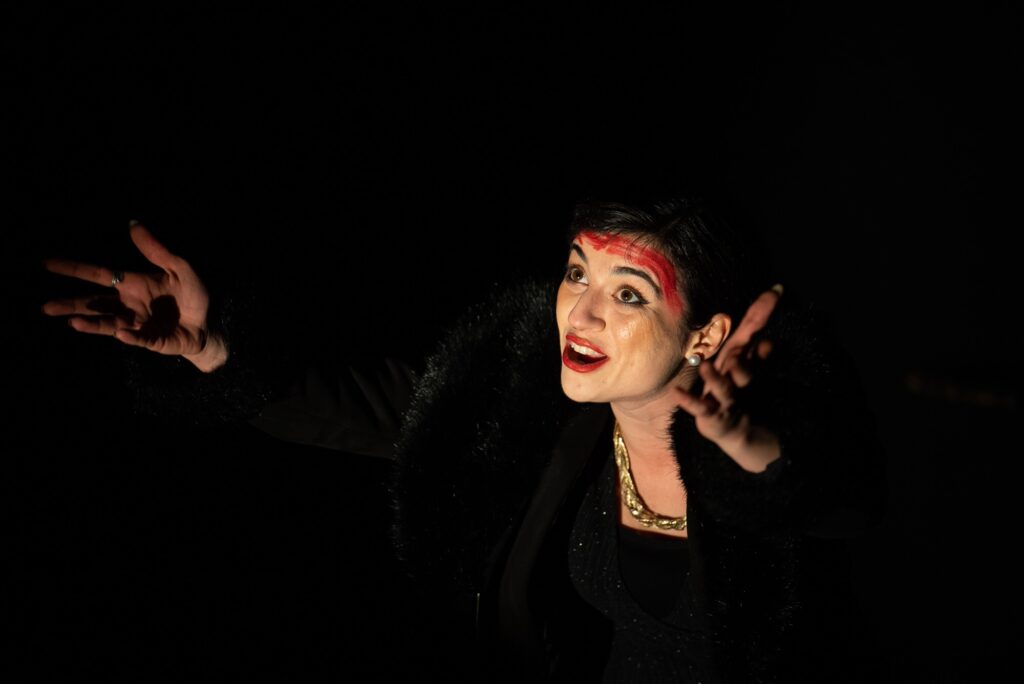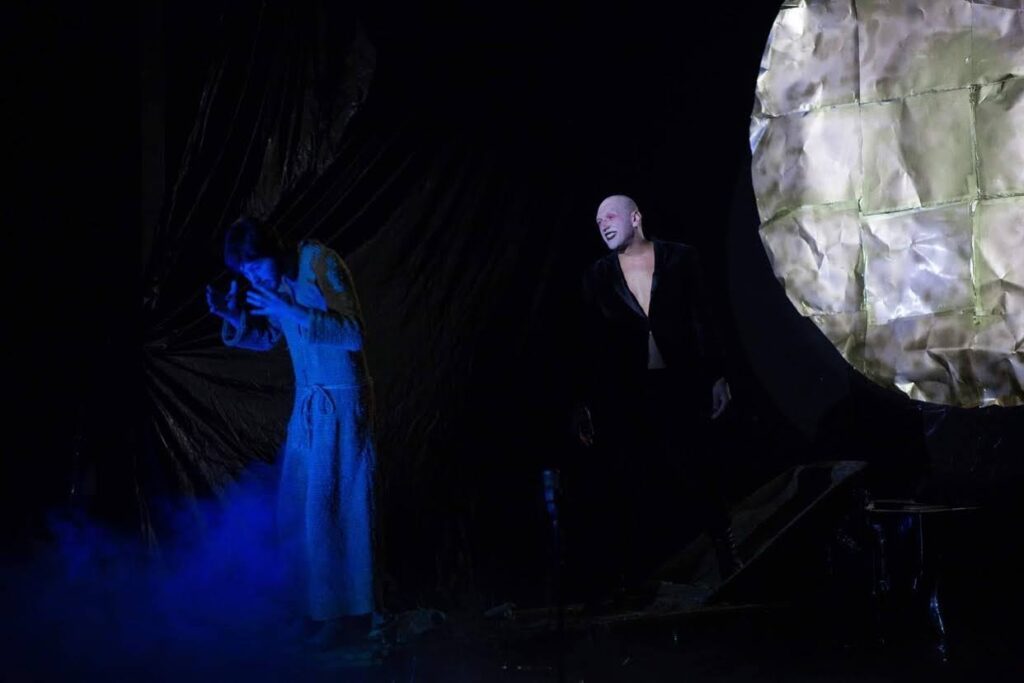Theatre director Dejan Angelov was born in Strumica, in the Republic of Macedonia, but studied at the National Academy for Theatre and Film Arts in Bulgaria. He talks to Ivanka Apostolova Baskar about the closed and nepotistic world of Macedonian theatre.
Ivanka Apostolova Baskar: Why are theater artists educated outside Macedonia not all that welcome in our national theaters; what are the barriers?
Dejan Angelov: I think the first and main reason is that the share of the “cake” is very small. And once someone gets some [of the cake], they greedily guard their part. In the whole of Macedonia, there are almost as many theatres as there are, for example, on just on two streets in Sofia.
For employment or any kind of artistic collaboration, people who have graduated from the Faculty in Skopje have a priority (regardless of their artistic aspirations or their work resume). Professors from Macedonia are already established, pushing and working for their students to get involved in projects or get jobs. There is a fear of the new and different but at the same time a somewhat unjustified sense of superiority among those who have graduated from the Faculty of Dramatic Arts in Skopje.
The amount of effort and hard work that has to be put in by the students coming from a theatrical school outside of Macedonia is incomparable with those who’ve graduated here. The more I try to make contact with colleagues and theatres in Macedonia, the more I get the feeling that the people who are residents in our theatres have lost touch with reality. There is only a handful of those who follow world trends, visit the theatre regularly or make an effort to further develop in their profession. Everything that is new and requires a little more effort is often viewed with contempt and immediately rejected.
Ivanka Apostolova Baskar: How do you experience the conformism and the inaccessibility of our central national theaters versus creating theater in the provinces? What are the conditions for making and creating theater in the Macedonian province?
Dejan Angelov: To best answer this question, I will give you an example from one of my personal experiences with the National Theater in Skopje. Two years ago when I returned from my final Erasmus trip in Lithuania, the first thing I did, right after landing, was to go to the National Theater in Skopje to discuss the possibility of finishing the remaining two months of my Erasmus practice in the largest artistic and national institution in Macedonia in order to get acquainted with the mechanism of the theatre and the people of this field in my home country, since I took my degree abroad and needed a way to get plugged in.
After speaking to the porter of the theater, he informed the director who was in charge back then, that a young director from the provinces had come to talk to her, to which she replied that there was no chance of her talking to me today and told him that I should come another day. I believe the porter took pity on me and convinced me to try again tomorrow and that he would personally take it upon himself that she lets me in.
So that’s what I did. I returned to my hometown Strumica and the very next morning took a bus to Skopje and there I was again at the gates of the same institution. As I waited outside, I saw the director right before she entered the theater (so she had no chance to ignore me this time) and said she would receive me in 15 minutes (which turned into 45). Upon entering her office, with all my youthful enthusiasm I told her all about my experiences and burning desire to take part in my homeland’s national theater and make the necessary contacts, gain experience, and bring to the table everything I learned abroad. She heard me out without interruption and then almost automatically stated that the priority for this type of internship have only the students who have graduated from the Academy in Skopje and that all of the spots are already taken and I have no place here as a student who has graduated in Bulgaria despite being a born and raised Macedonian. For her, there was no need for any further dialogue. As if I didn’t exist.
After those words, I just got up and left. I think that this example best captures the ignorant and self-deprecating attitude of our Republic’s national institutions and the people who lead them. Institutions are trapped by semi-literate mediocrities, literally, people who have nothing related to the theater. And they have turned it into a tool, an instrument for fulfilling their personal, professional or political goals without any vision and knowledge or responsibility for artistic development. They act as if theatre is their personal property. Tastelessness rules these buildings. The end game is making money from cheap third-class comedies that will quickly fill the seats and their pockets. From a sanctuary and a temple, the theater was turned into an open market.
And on the flip side, opening and running a theatre in the provinces is like pushing a heavy rock up an endless uphill. There are no conditions for opening and running a legitimate theatre in the provinces, and here I am with my small circle of like-minded people who are still trying to facilitate space for independent theatre. Only a few of us are standing against the mass mindset of conformism and nepotism.

Victoria. Photo: Dejan Angelov
Ivanka Apostolova Baskar: A lot of people employed in the Macedonian theater (with a pension and insurance) who are making decisions about our theater festivals or theater programmes, have a deep gap in their knowledge of the regional and internationals scenes; given we have this problem with weak cultural policies, do you feel the relevance of our domestic theater is fragile?
Dejan Angelov: Yes, that’s exactly right. Because it works according to the principle: A favor for a
favour. Theater or festival directors are often not even remotely interested in whether a play has any artistic and societal value or whether a future project will have the capacity to turn into a yearly cultural event, they simply return favours in hope that in the future when they are no longer in “positions” they won’t be forgotten by those they favoured. It’s the vicious closed circle of the “elite”. That is the cruel reality and the principle by which they work.
Ivanka Apostolova Baskar: Dejan, you collaborate with Tranzen in Strumica [an organisation working on cultural policy and the democratisation of theatre], how does collaboration with them takes place in a theatrical performance?
Dejan Angelov: The Tranzen Cultural Association is of life-saving value for those artists who refuse to give in to the rotten system or are simply trying to end the vicious cycle of political games. At the moment, Tranzen represents a strong opposition to the conformist lethargy and are really trying to make and support art that has true quality and value. They are more than just a cultural association because they are not only active but proactive – they find the people who need to express themselves artistically and then provide them with appropriate work in their field. this is not only my experience but other of their collaborators can also testify to that. They are ‘cultural workers’ in the true sense of the word. The most essential difference between them and the institutions is that there is genuine care, as well as legitimate and lawfully documented financial support.
Ivanka Apostolova Baskar: Dejan, what are the projects are you working on later this year?
Dejan Angelov: This year, there are two big projects are ahead of me: one in the Theater in Veles, with the play Antigone by Jean Anoui, and the other is an independent production in my hometown Strumica. I also have upcoming festival trips with the monodrama Victoria across Macedonia and abroad.

Cain. Photo: Dejan Angelov
Ivanka Apostolova Baskar: Two of your plays, Cain, with the actor Stojan Trn Velkov and Victoria, with the actress Mirna Trpkova, are currently active on stage; why were you drawn to these artists and topics? and because of what kind of local and international context?
Dejan Angelov: The answer to this question is closely related to the theme that recurs in both plays, the theme of the rebellious man who discovers the world, society and even life as a “mistake”, an absurdity and tries to generate his own meaning or sense. Man is a generator of meaning. This is the established theme in Camus’s philosophy, but also the literature of Dostoevsky and Byron. Only the rebellious, awakened and burning-with-passion-for-life kind of consciousness can accumulate knowledge.
In that line of thought, the play Cain elaborates on the metaphysical rebellion, the rebellion of Man against the Creator and all his creation, while in Victoria the rebellion is directed at the injustices and absurdities of society and wrongful parenting (getting lost in the external and meaningless). That is why I chose Stojan and Mirna, because in the environment in which I live these happen to be the actors and people who have rich life experiences and keep their minds open, and according to my personal convictions only such thirst for continuous education and knowledge can create change and move humanity toward progress.
Further readings: Eva Kamchevska: “Something is very rotten in the system.”
Дејан Ангелов, режисер: Центарот за култура „Антон Панов“ е дувло на медиокритети и
малограѓанштина
Dr Ivanka Apostolova Baskar is a self-employed author, editor, translator, lecturer, programme producer, creator of video theatre projects, and visual dramaturg. She collaborates with the Theater Times USA, Mediantrop-Belgrade; Macedonian Center ITI/PRODUKCIJA, Skopje Kreativa - Festival for Creative Industries, Faculty for Art and Design/EURM Skopje, and Stone Design`s No Man`s Land-Macedonian Pavilion, Venice Biennial-Architecture 2016. She is author of Theater Comics 1997-2020; In Search of Lost Director 2008-2020; Antropologija izkušenj v gledališču, 2019.








